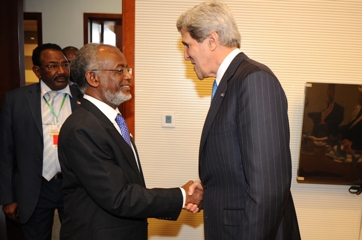Sudan’s opposition sees little chance to normalise ties with US
September 10, 2013 (KHARTOUM) – The opposition National Umma Party (NUP) has described as slim the chances of the government succeeding in its attempts to normalise relations with the United States unless Khartoum fulfills certain longstanding concerns of Washington.

Abdel-Wahab further stressed that the US administration will not respond to the government’s request not to interfere into Sudan’s internal affairs as stated by foreign minister Ali Karti last week.
Last week, Karti announced that Sudan is awaiting the arrival of the newly appointed US envoy Donald Booth to see if he will offer a clear “road map” to resolve the issues between the two countries or not.
“If the new U.S. envoy has a clear roadmap for relations between Khartoum and Washington, including helping to resolve the remaining files, we welcome this role but if he goes to other issues we will certainly move away from him,” Karti was quoted in statements carried by Sudan state media.
The NUP spokesperson also projected that the government’s speech at the meetings of the United Nations General Assembly (UNGA) current session would not be welcomed by the international community, pointing that those meetings represent a good opportunity for the member states to show their records on freedoms, democracy, human rights, and human dignity.
Sudan has been under the US blacklist of states sponsoring terrorism since 1993 on allegations of harboring Islamist militants despite reports of Sudan being a cooperative intelligence partner of Washington in the “war on terror” over the last decade.
Sudan is also subject to comprehensive economic sanctions since 1997 over terrorism charges as well as human right abuses. Further sanctions, particularly on weapons, have been imposed since the 2003 outbreak of violence in the western Darfur region.
The US has promised to remove Sudan’s terrorism designation if it facilitated South Sudan’s referendum and recognize its results. South Sudan voted to secede from Sudan in January 2011 and declared independence in July that year.
However, the conflicts that erupted in South Kordofan and Blue Nile border states last year as well as lack of progress on post-referendum matters made Washington attach additional conditions for the de-listing process.
The White House said that the new US envoy will work with the African Union (AU) and the international community to facilitate the resolution of pending issues between the two countries, including Abyei referendum and the disputed border zones.
He will also seek to aid efforts aimed at ending the ongoing conflicts in Darfur, Southern Kordofan, and Blue Nile “as part of a holistic solution to Sudan’s human rights, humanitarian, and governance crises”, the White House underlined.
(ST)

